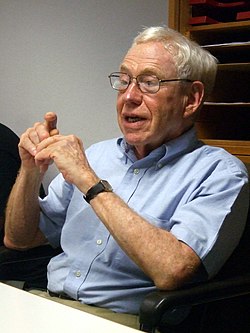Hubert Dreyfus
| Hubert Dreyfus Filosofi 20./21. århundrede | |
|---|---|
 Dreyfus 2011 | |
| Personlig information | |
| Født | 15. oktober 1929 Terre Haute, Indiana, USA |
| Død | 22. april 2017 (87 år) Berkeley, Californien, USA |
| Dødsårsag | Kræft |
| Uddannelse og virke | |
| Uddannelsessted | Harvard Universitet |
| Medlem af | American Academy of Arts and Sciences |
| Beskæftigelse | Universitetsunderviser, forfatter, filosof |
| Faglig interesse | Fænomenologi, eksistentialisme, litteraturfilosofi, psykologifilosofi og kunstig intelligens filosofi |
| Arbejdsgiver | University of California, Berkeley, Massachusetts Institute of Technology, Brandeis Universitet, Johann Wolfgang Goethe-Universität |
| Påvirket af | Martin Heidegger, Maurice Merleau-Ponty, Michel Foucault, Søren Kierkegaard, Dagfinn Føllesdal |
| Har påvirket | Kunstig intelligens (filosofisk kritik), Richard Rorty, Mark Wrathall, Sean Dorrance Kelly, Charles Taylor, John Haugeland, John Searle, Taylor Carman |
| Betydningsfulde idéer | Dreyfus' kritik af kunstig intelligens, postkognitivisme, Heideggers hermeneutiske realisme[1] |
| Information med symbolet | |
Hubert Lederer Dreyfus (født 15. oktober 1929, død 22. april 2017) var en amerikansk filosof og filosofiprofessor ved University of California, Berkeley.
Hans primære interesser omfattede fænomenologi, eksistentiel filosofi og filosofi vedrørende psykologi og litteratur, såvel som de filosofiske implikationer af kunstig intelligens. Dreyfus var kendt for sin eksegese af Martin Heidegger, hvis kritik blev kaldet "Dreydegger".[2]
Bibliografi
- 1965. "Alchemy and Artificial Intelligence". Rand Paper.[3]
- 1972. What Computers Can't Do: The Limits of Artificial Intelligence. ISBN 0-06-011082-1
- 1979. What Computers Can't Do: The Limits of Artificial Intelligence. (revised) ISBN 0-06-090613-8, ISBN 0-06-090624-3.
- 1983. (med Paul Rabinow) Michel Foucault: Beyond Structuralism and Hermeneutics. Chicago, Ill: The University of Chicago Press. ISBN 978-0-226-16312-3
- 1986 (med Stuart Dreyfus). Mind Over Machine: The Power of Human Intuition and Expertise in the Era of the Computer. New York: Free Press.
- 1991. Being-in-the-World: A Commentary on Heidegger's Being and Time, Division I. Cambridge, MA: MIT Press. ISBN 0-262-54056-8, ISBN 978-0-262-54056-8
- 1992. What Computers Still Can't Do: A Critique of Artificial Reason. Cambridge, MA: MIT Press. ISBN 0-262-54067-3
- 1997, Disclosing New Worlds: Entrepreneurship, Democratic Action, and the Cultivation of Solidarity, (medforfatter, med Fernando Flores og Charles Spinosa)
- 2000. Heidegger, Authenticity, and Modernity: Essays in Honor of Hubert Dreyfus, Volume 1. Cambridge, MA: MIT Press. ISBN 0-262-73127-4.
- 2000. Heidegger, Coping, and Cognitive Science: Essays in Honor of Hubert L. Dreyfus, Volume 2. Cambridge, MA: MIT Press. ISBN 0-262-73128-2
- 2001. On the Internet Revised Second Edition. London and New York: Routledge. ISBN 978-0-415-77516-8
- 2011. (med Sean Dorrance Kelly) All Things Shining: Reading the Western Classics to Find Meaning in a Secular Age. Reviewed by Garry Wills in New York Review of Books, April 7, 2011, pages 16–18.
- 2015. (med Charles Taylor) Retrieving Realism. Harvard University Press.
Se også
Kilder/referencer
- ^ Hubert L. Dreyfus, Mark A. Wrathall (eds.), Heidegger Reexamined: Truth, realism, and the history of being, Routledge, 2002, pp. 245, 274, 280; Hubert L. Dreyfus, "Heidegger's Hermeneutic Realism," in: David R. Hiley, James Bohman, Richard Shusterman (eds.), The Interpretive Turn: Philosophy, Science, Culture, Cornell University Press, 1991.
- ^ Woessner, Martin (2011). Heidegger in America. Cambridge University Press. s. 203. ISBN 978-0-521-51837-6.
- ^ Alchemy and Artificial Intelligence
Eksterne henvisninger
- Professor Bert Dreyfus at the Berkeley Philosophy Department Web page
- Professor Bert Dreyfus's UC Berkeley Home Page
- Professor Bert Dreyfus' online papers at UC Berkeley, with links to old Berkeley web page arkiveret hos Wayback Machine (5. december 2006)
- Hubert Dreyfus på Internet Movie Database (engelsk)
- Webcast: Man, God, and Society in Western Literature
Medier brugt på denne side
Forfatter/Opretter: Jörg Noller, Licens: CC BY-SA 3.0 de
American philosopher Hubert Dreyfus during an event at Ludwig Maximilian University of Munich
